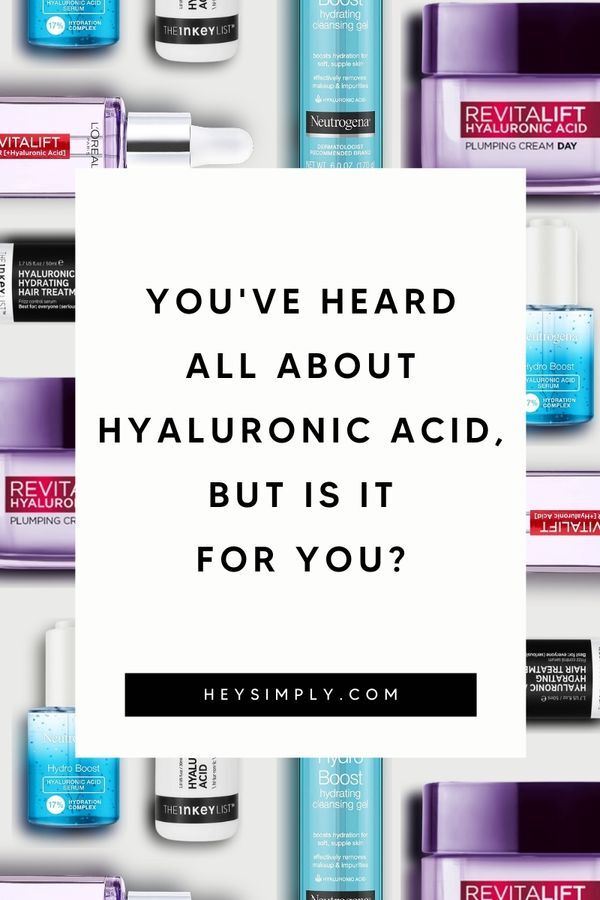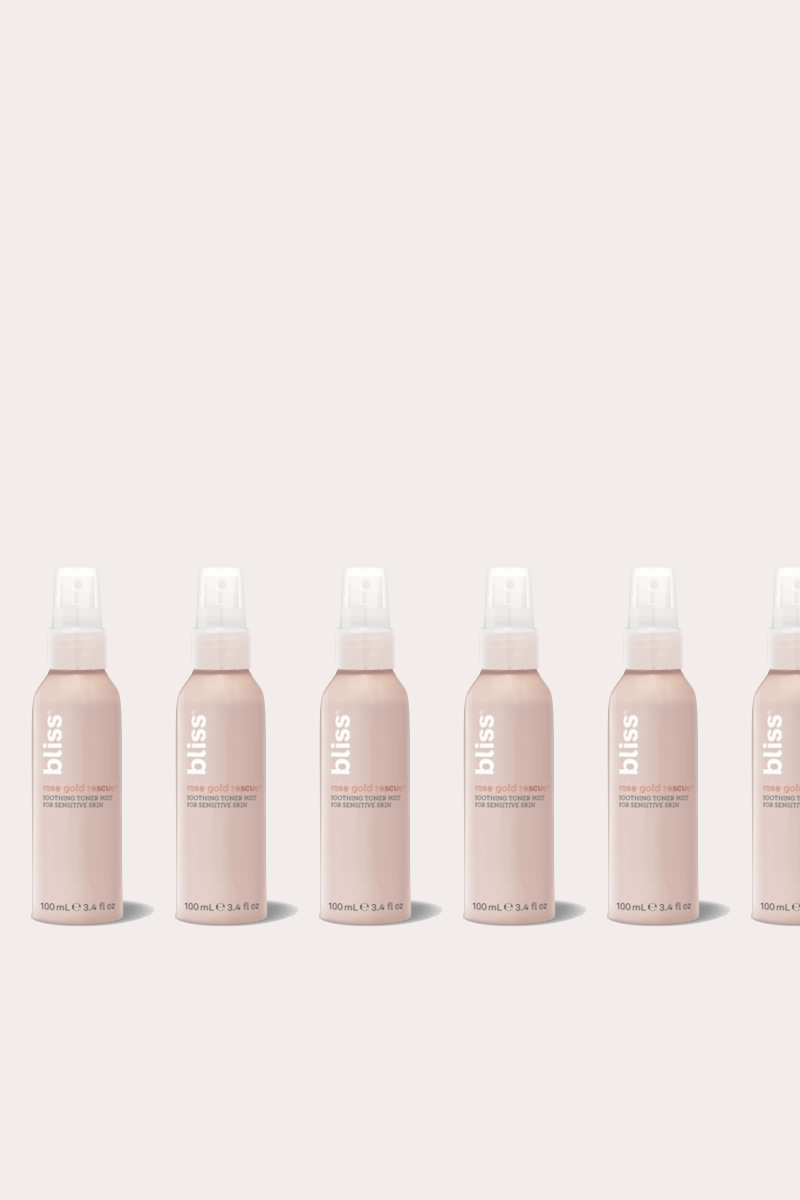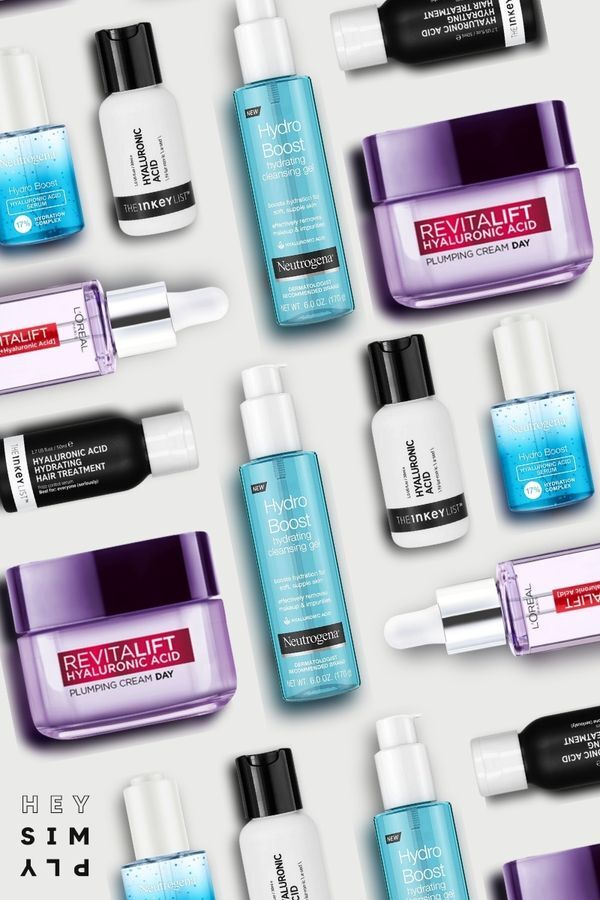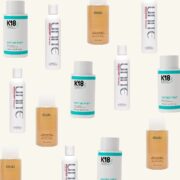Per pretty much every chemistry class, rule #1 was no acids near the face. So be forewarned that this post is breaking that rule and you probably should too.
Now, this doesn’t mean that you should casually crack open a beaker and drizzle it on your face – but you should look to learn more about certain acids that are good for the skin, and let’s start with the one that’s the hardest to spell: hyaluronic.
What is hyaluronic acid and should you use it?
Related: Brilliant Hacks For Everyday Skin

Do you remember around 2018 when all anyone could talk about was hyaluronic acid? It was considered the holy grail of skincare. As time has gone on, more research has come out and the narrative has changed a bit.
Over the years there has been more independent research about the effects of artificial hyaluronic acid on the skin, which is what is found in skincare products.
The illusion about it being perfect is definitely gone, but there is no denying that it is a good humectant and has skincare benefits.
Here’s what we’ve learned.
Favorite Hyaluronic Acids

How to pronounce Hyaluronic Acid
Good question! Hyaluronic = “hi-lore-on-ic” that’s it!
Related: WTF Is Toner & Do I Really Need it??
So, What Is Hyaluronic Acid?
Hyaluronic Acid is actually a sugar. Our skin produces Hyaluronic Acid naturally to keep your skin hydrated. The substance is dispersed throughout our body in our tissues.
Hyaluronic Acid is not an anti-aging ingredient. Here’s Skincare 101: The natural enemy of aging is keeping your skin hydrated so that it can continue to have elasticity and be more “bouncy”.
As we age and environmental factors like smoke, sun, and pollution way in, we lose the moisture in our skin. Without moisture, we also cue up dullness, fine lines, texture, and sensitivity.
While hyaluronic acid is vital to healthy skin, remember that your skin naturally produces this ingredient.
Serums are wonderful supplements, but ****hyaluronic acids made in a lab have a lower molecular weight compared to what your skin creates naturally. ****
What does this mean?
It means that too much can actually create inflammation in your skin.

What does Hyaluronic Acid do?
Long story short: Hyaluronic acid helps to hydrate the skin and maintain this hydration.
How does it do that? Well, a single gram of natural hyaluronic acid has the ability to hold two gallons of water. ****
Although many of us are convinced that hyaluronic acid is the holy grail ingredient, you shouldn’t feel pressured to buy any new products. However, of all the basic skincare ingredients, this is one of my favorites.
Who should use Hyaluronic Acid?
Everyone! It is a low risk ingredient that increase hydration in your skin.
However, the prolonged use of hyaluronic acid has shown signs of inflammation in some people. This is because the hyaluronic acid made in a lab is nowhere close to the kind our body produces.
As we mentioned before, a few of the negative reactions to products containing hyaluronic acid have surfaced over time and this just means that we need to be mindful of moderation and observe our skin while using products with hyaluronic acid.
Different types of Hyaluronic Acid
Hydrolyzed hyaluronic acid, sodium acetylated hyaluronate, and sodium hyaluronate are three different types of hyaluronic acid you can find in skincare items. Sodium hyaluronate has a lower molecular weight than hyaluronic acid and hydrolyzed hyaluronic acid.
Many brands make your life easier by using two or all three different types of hyaluronic acid in their products. Their effects are used interchangeably, so one is not better than another.
Favorite Hyaluronic Acid Products
In my opinion, hyaluronic acid is not an ingredient you need to splurge on. The formulation often is similar between drugstore and high-end products so if you are looking to keep your routine at a certain price point this is definitely a place to save.
Here are some of my favorite products:
- L’Oreal Revitalift
- The INKEY List Hyaluronic Acid Hydrating Serum
- Neutrogena Hydro Boost Hydrating Hyaluronic Acid Serum
Who should not use Hyaluronic Acid?
We all need more hydration and hyaluronic acid works for any skin type. However, the results that hyaluronic acid offer has varied from person to person and it also really depends on the usage.
How to add Hyaluronic Acid to your routine?
Skip the face wash and cleansers because it doesn’t stay on long enough to make an impact. Go for the pure substance in serums or moisturizers that you can keep on.
Always apply hyaluronic acid to damp skin. You don’t want the molecules in the hyaluronic acid serum to draw moisture from the deeper layers of your skin.
Pro tip: You can spray on toner or water right before applying hyaluronic acid serum.
I recommend using it as a serum and applying it twice a day (morning and night) before your moisturizer OR you can opt for a product that has hyaluronic acid in it like this one.
Related: Why you need a toner? Read this post to find out
Mixing Hyaluronic Acid with other products
Hyaluronic acid’s nature allows it to pair well with most skincare ingredients. As long as the hyaluronic itself is not irritating you shouldn’t have any issues layering it with other ingredients. Remember, layers don’t mix!
FAQ about Hyaluronic Acid
Although hyaluronic acid is a very popular ingredient, here are a few popular questions.
Is it okay to use Hyaluronic Acid every day?
This depends on your skin and how much water is present in the air around you. If you use too much hyaluronic acid while in dry air you may not see additional benefits. Using a serum once a day or once every other day is a good rule of thumb.
Why is Hyaluronic Acid good for your face?
Hyaluronic acid reduces the appearance of fine lines by plumping up the skin. It is not a permanent solution, but while your skin is hydrated due to the hyaluronic acid it will have a chance to fight other battles that will help improve its appearance.
Should I use moisturizer after Hyaluronic acid?
Always seal in the hydration with moisture. Hyaluronic acid is great for the skin but applying a moisturizer after might be the more important step you take.
Always moisturize!
Related: Answers to your burning skincare questions from a dermatologist
Things no one tells you about Hyaluronic acid
We have heard so many great things about hyaluronic acid but there is a ton of new research that reminds us of the importance of using everything in moderation.
Long-term use of hyaluronic acid has caused some people some side effects like inflammation of the skin.
Set your expectations
One of the biggest issues with man-made hyaluronic acid (remember it already naturally exists in our skin tissues) is that the molecular structure is altered to a point where it does not match the natural hyaluronic acid in your skin. It is designed to penetrate your pores and plump up your skin.
Even these smaller molecules do not penetrate past your epidermis, so take all those ads you see with a grain of salt. In fact, Peter Thomas Roth faced a class action lawsuit about its claims regarding hyaluronic acid and how it is inaccurate and misleading to the audience.
Although it is true that hyaluronic acid can hold up to 1000x of its weight of the water it is important to note that lab-made hyaluronic acid does not exactly work that way (hence the lawsuit)
Hyaluronic acid is still a crucial skincare ingredient, but because it works like a sponge it will pull water from anywhere – even the depths of the skin. This is why you need to ensure your skin is wet when applying the serum.
What is the problem with low molecular weight Hyaluronic Acid?
But the real issue that is becoming clearer is that too much of the low molecular weight hyaluronic acid sets off a cascade of inflammations because it binds to the TLR receptors, in your skin. I know we’re getting a little sciencey – but hear me out.
Your TLR receptors are responsible for your innate immune system and when that is compromised, your skin freaks out, to say the least.
This spiel however is merely a word of caution. Hyaluronic acid is still one of the best humectants in the market and it can be a worthy addition to your routine when used in moderation.
Final Thoughts on Hyaluronic Acid
There are many great benefits to using hyaluronic acid but as always, nothing is good in excess. Man-made versions of natural substances will never be perfect and we need always be careful about how we use these ingredients.
Don’t overdo it. Understand that ingredients like hyaluronic acid offer a more temporary solution than a permanent cure.
Even though it sounds scary, hyaluronic acid can be a useful part of a good skincare regimen. It can reduce the appearance of wrinkles, dry skin, and redness to give your skin a more healthy and hydrated glow.













